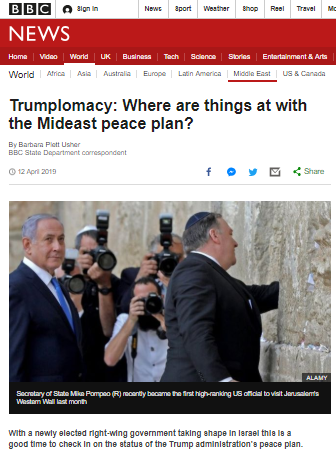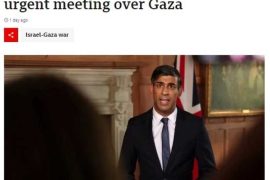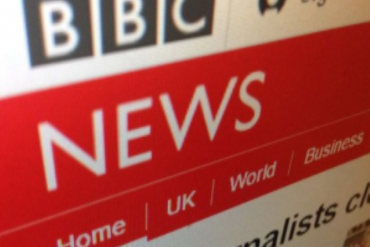Around a quarter of the airtime on the November 10th afternoon edition of the BBC World Service radio programme ‘Newshour’ was given over to the death earlier that day of Saeb Erekat.
“…we hear tributes to one of the leading Palestinian political figures of the past 30 years, Saeb Eerekat, who has died after contracting Covid-19.”
As was the case in a BBC Radio 4 report on the same story, at no point in the 12:41 minute item (from 30:04 here) were listeners told that he had been treated in an Israeli hospital for over three weeks before his death.
The item did however resurrect the ‘Palestine Papers’ story along with Erekat’s own unchallenged promotion of the anti-Israel ‘apartheid’ smear.
Presenter Paul Henley introduced the item:
[emphasis in italics in the original, emphasis in bold added]
Henley: “One of the most celebrated Palestinians of recent times, Saeb Erekat, has died. He was an academic and negotiator: a leading figure for decades in peace talks with Israel. Mr Erekat had had serious health problems for several years and recently he contracted Coronavirus. His reputation among his fellow Palestinians suffered a big blow in 2011 when confidential memos were leaked suggesting that his team had privately offered concessions to the Israelis that contradicted their public position. Our Middle East editor Sebastian Usher looks back on his life.”
Sebastian Usher began with an inaccurate account of Erekat’s place of birth.
Usher: With his excellent English and urbane and business-like demeanour, Saeb Erekat was one of the best-known spokesmen for the Palestinian cause. Born in Jericho in the West Bank to a prominent family, he decided early on that the only solution to the Israeli-Palestinian conflict was through negotiation. He began advocating this in the early 1980s in Palestinian newspapers while continuing his work as a lecturer in political science. He was talent spotted and brought in as part of a younger Palestinian leadership in the West Bank. In the 1990s he began to take a key role in peace negotiations with Israel, both at the historic Madrid conference and the later Washington talks. But he resigned after the secret Oslo Accords were made public in 1993. He did however become the only prominent leader from the West Bank to join Yasser Arafat’s Palestinian Authority when it was set up in Ramallah. He remained loyal to Arafat through the years, serving as a minister and an MP, although he never built up his own political power base despite his high visibility on the international scene. He participated in the Camp David and Taba peace talks in 2000 and 2001. But he later expressed his own deep personal disappointment and sense of failure over the lack of a deal to give the Palestinians a fully independent state.”
Usher then promoted a partisan and highly debatable view of the leaked memos made public by Al Jazeera and the Guardian in 2011.
Usher: “The publication in 2011 of confidential memos known as the Palestine Papers damaged his reputation amongst Palestinians further. They seemed to show that he and his negotiating team had been ready to do backdoor deals with Israel that would give away more than the Palestinians had ever publicly agreed to. Mr Erekat condemned the leak as a slander campaign. He also said that, if nothing else, it showed that Israel did have a genuine partner for peace in the Palestinians – a description that even his critics would have to concede as a fitting epitaph for Saeb Erekat himself.”
As BICOM noted at the time:
“The documents differ so starkly from the claims made about them that it perhaps raises serious questions about journalistic integrity. In trying to make a case that the Palestinians were subservient and the Israelis uncompromising, the Guardian repeatedly misrepresents the documents themselves…”
Henley then introduced edited and spliced archive recordings from an interview given by Erekat to BBC World Service radio in June 2019.
Henley: “Mr Erekat was a vocal critic of the Trump administration’s approach to Israeli-Palestinian relations. He defended the idea of a two-state solution when he spoke to Newshour’s Razia Iqbal last year.”
Erekat: “I don’t think the notion of the two-state solution will ever disappear because it’s the only solution. If not this year, in 50 years. The difference will be how many Israelis and Palestinians will be killed because of these short-sighted, political blind politicians who believe that they’re here to carry out the settlement programme.”
Iqbal: “But you say that the two-state solution will never disappear but there is also the idea of one state and equal rights for citizens, isn’t there?”
Erekat: “This will never be accepted by Israelis. Netanyahu and Kushner are trying to dictate what I call one state, two systems: apartheid. There are roads in the West Bank I cannot use today. I have a green ID card. Netanyahu has a blue ID card. I drive a car with white and green licence plate. Netanyahu drives a car with yellow licence plate. There is a deeper apartheid system in the West Bank and East Jerusalem today than the one that existed in the darkest hours of South Africa’s apartheid. That’s the truth. So if one state, two system apartheid is not gonna work and we’re not gonna make it work and if what many of Palestinians now are saying one state equal rights which is [unintelligible] as concept for Jews, Muslims and Christians to live equal, it’s not doable for Israelis. Palestinian and Israeli relations is like physics; there is no vacuum. If they kill the two-state solution that will translate into blood of Palestinians and Israelis.”
As was the case when that interview was first broadcast, no effort was made to challenge Erekat’s repeated gratuitous use of the apartheid smear. Once again listeners were not told that while there is a grand total of 40.22 kms of roadway that Palestinian plated vehicles cannot use for security reasons, there are also roads – for example in Erekat’s former place of residence, Jericho – that Israeli vehicles cannot access. Neither was it clarified that Erekat’s licence plates would be a different colour to those of Israeli vehicles because he lived in Area A under total Palestinian Authority control and his vehicle registration came from that authority, not from Israel. Likewise, Erekat was not an Israeli citizen and hence did not have the blue ID card given to all Israeli citizens regardless of religion or ethnicity.
Despite repeatedly touting Erekat as a proponent of the two-state solution, this item made no effort to inform listeners that his idea of that concept was a Palestinian state on what he repeatedly but erroneously termed “the 1967 borders” alongside an Israeli state which would include Palestinian refugees given the ‘right of return’. Neither did audiences hear of his defence of the PA and PLO policy of payment of salaries to terrorists and their families or his central role in the promotion of the myth of a ‘massacre’ in Jenin in 2002.
Having established the narrative of Erekat as a ‘peacemaker’ whose efforts were frustrated by others, the item went on to promote decidedly one-sided “tributes” which will be discussed in part two of this post.
Related Articles:
THE BBC NEWS WEBSITE’S AIRBRUSHED PORTRAIT OF SAEB EREKAT
BBC’S ME EDITOR PROMOTES ‘APARTHEID’ TROPE IN EREKAT EULOGY






Erekat was a notorious liar and took every step possible to torpedo every negotiation with Israel .
Far from being a negotiator, he was the Palestinians’ arch non-negotiator.